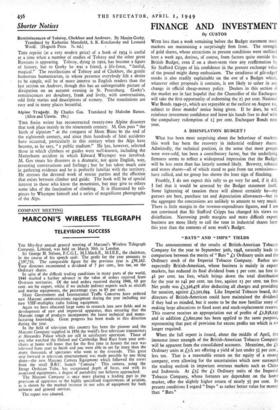FINANCE AND INVESTMENT
By CUSTOS
WITH less than a week remaining before the Budget statement stock markets are maintaining a surprisingly firm front. The strength of gold shares, whose attractions in present conditions were outlined here a week ago, derives, of course, from factors quite outside the British Budget, even if on a short-term view any reaffirmation by Sir Stafford Cripps of his confidence in the present exchange value of the pound might damp enthusiasm. The steadiness of gilt-edged stocks is also readily explainable on the eve of a Budget which, whatever other proposals it contains, is not likely to usher in any change in official cheap-money policy. Dealers in this section of the market are in fact hopeful that the Chancellor of the Exchequer will take the first opportunity of redeeming the 21 per cent. National War Bonds 1949-51, which are repayable at the earliest on August 1st, subject to three months' notice being given. If he does, he will reinforce investment confidence and leave his hands free to deal with The compulsory redemption of a per cent. Exchequer Bonds next year.
A DISINFLATION BUDGET ?
What has been most surprising about the behaviour of markets this week has been the recovery in industrial ordinary shares. Admittedly, the technical position, in the sense that most groups were over-sold, has been a contributory factor, but the underlying firmness seems to reflect a widespread impression that the Budget will be less stern than has latterly seemed likely. Brewery, tobacco and stores shares—all of which stand to gain from tax remissions— have rallied, and no group has shown the least sign of flinching.
Frankly, I do not expect this rally to go very far and, if it did, I feel that it would be arrested by the Budget statement itself. Some lightening of taxation there will almost certainly be—my guesses are beer, purchase tax and depreciation allowances—but in the aggregate the concessions are unlikely to amount to very much. There is little margin in the revenue-expenditure figures, and I am not convinced that Sir Stafford Cripps has changed his views on disinflation. Narrowing profit margins and more difficult export business are more likely to call the tune in industrial shares later this year than the contents of next week's Budget.
" BATS " AND " IMPS " YIELDS
The announcement of the results of British-American Tobacco Company for the year to September 3oth, 1948, naturally leads to comparison between the merits of "Bats " it Ordinary units and the Ordinary stock of the Imperial Tobacco Company. Rather un- expectedly British-American, whose business is mainly in export markets, has reduced its final dividend from 5 per cent. tax free to 4i per cent. tax free, which brings down the total distribution for the year to 14i per cent. tax free, against 15 per cent. tax free. Net profit was £5,326,478 after deducting all charges and providing for taxation, against £5,501,694. Like Imperial Tobacco board, the directors of British-American could have maintained the dividend if they had so minded, but it seems to be the now familiar story of making large allocations to fixed asset and stock-replacement reserve. This reserve receives an appropriation out of profits of £1,838,193 and in addition £3,600,000 has been applied to the same purpose, representing that part of provision for excess profits tax which is no longer required.
When the full report is issued, about the middle of April, the immense inner strength of the British-American Tobacco Company will be apparent from the consolidated accounts. Meantime, the £1 Ordinary units at £5-laic are offering a yield of just under 54- per cent., less tax. That is a reasonable return on the equity of a strong company, even allowing for the uncertainties which now surround the trading outlook in important overseas markets such as China and Indonesia. At £58 the £x Ordinary units of the Imperial Tobacco Company, whose fortunes are dependent on the home market, offer the slightly higher return of nearly 54- per cent. In present conditions I regard " Imps " as rather better value for money than "Bats."






































 Previous page
Previous page